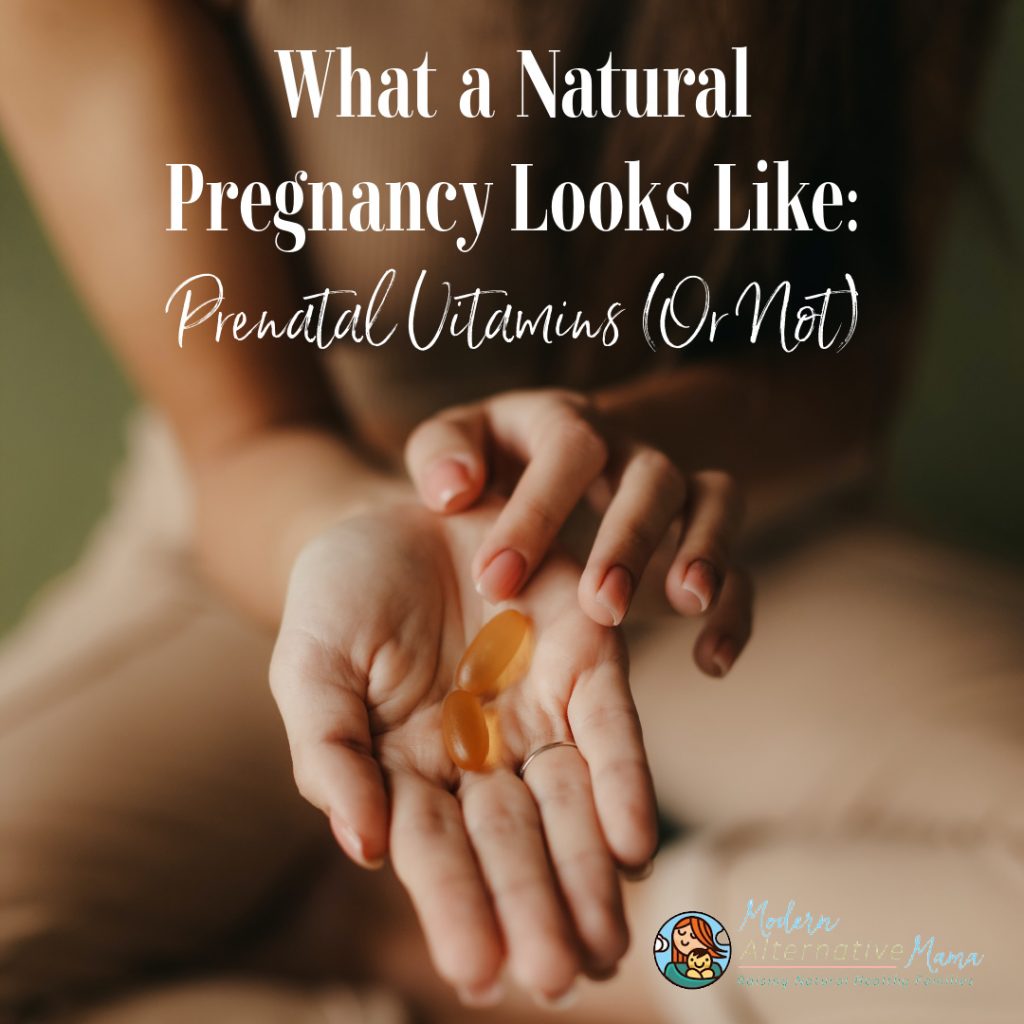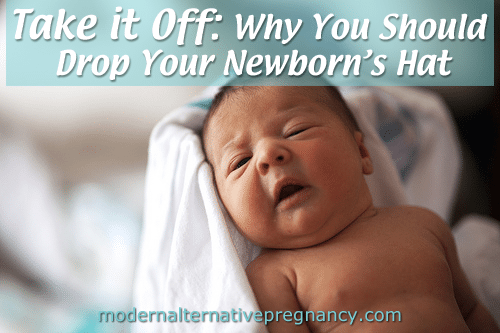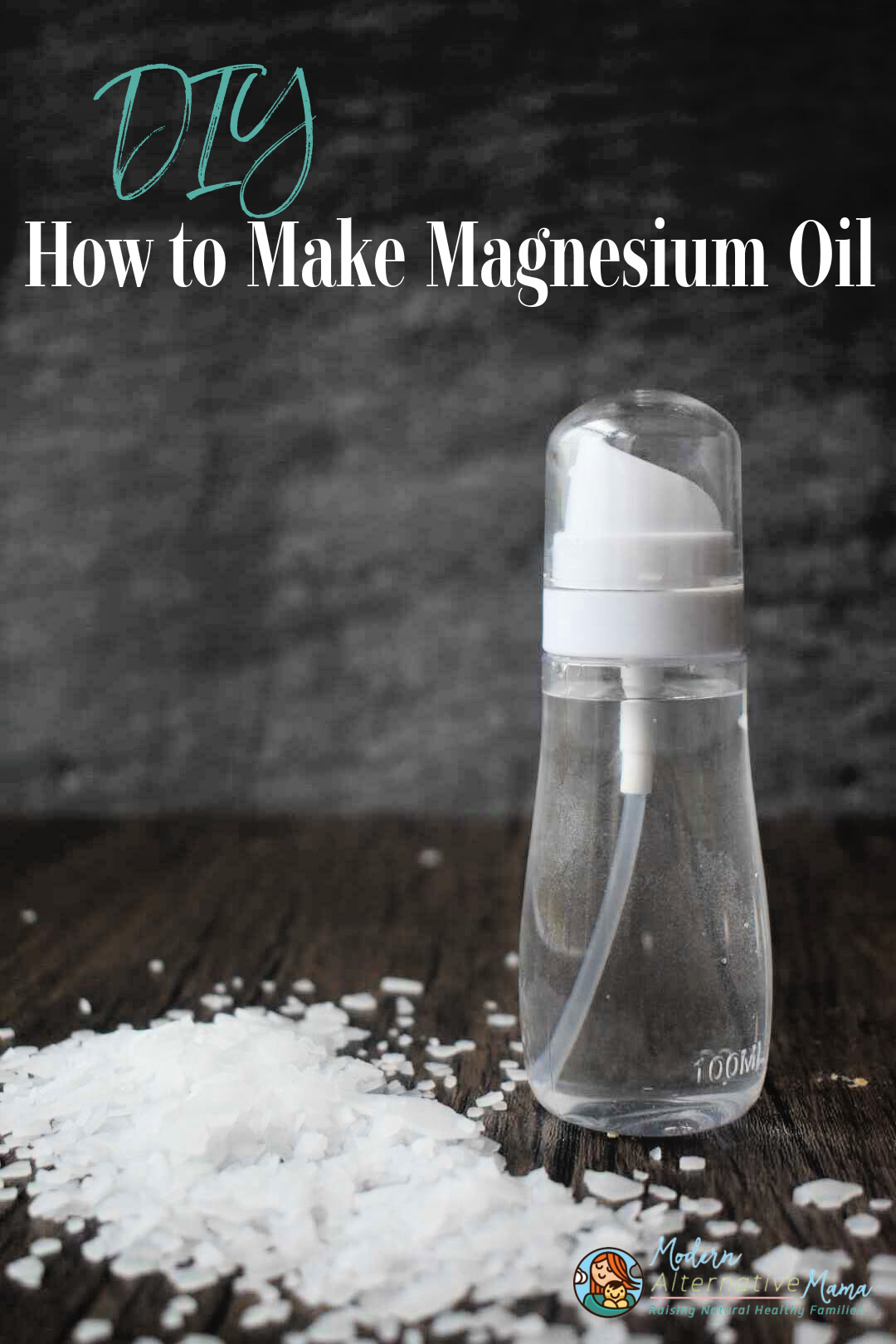One of the most commonly-asked questions when people find out you are pregnant is, “What prenatal vitamins are you taking?” Of course, it makes sense. Prenatal vitamins are heavily pushed in both the ‘natural’ community and the mainstream. But…are they necessary? Are they healthy? Should you be taking them?
What a Natural Pregnancy Looks Like: Prenatal Vitamins (Or Not)
I have a bit of a different perspective on prenatal vitamins than most do, honestly.
I’ve seen all the debates in different groups. In fact, the question of which prenatal vitamin is best — and a variety of answers — comes up practically daily in my own Facebook group.
The answers usually read like this:
- Baby and Me Mega-Food!
- Garden of Life!
- Smarty Pants!
- The Synergy Company PureNatal!
- Seeking Health Prenatal!
These are among the top brands out there for natural-leaning mamas. There are others. People are obviously being careful with their choices, looking for an option that contains folate instead of folic acid, choosing something that’s food-based. Many of these prenatal vitamins contain some herbs or fruit/veggie extracts. They definitely aren’t bad, as vitamins go. If you really had to choose a pill, I’d certainly choose these over the mainstream junky brands.
Even so…I don’t use any of them. I haven’t used any specific prenatal vitamins with any of my last four pregnancies. I don’t necessarily recommend any of them, either — I’ll get to that in a minute.
No Prenatal Vitamins?!
That’s right. Starting with my third baby, I did not use any prenatal vitamins.
Also starting with my third baby, I carried my babies longer (right at 40 weeks, vs. 38 – 39 with my first two), they were bigger and healthier at birth, and I recovered much more easily postpartum and felt stronger.
Obviously, not taking a prenatal vitamin didn’t do me or my baby any harm! It actually did the opposite!
I sort of came to this way of thinking during my second pregnancy, which was my “natural awakening,” of sorts. In my first pregnancy, I simply doubled up on Flintstones chewables, as per my OB. I dealt with serious constipation late in pregnancy and was told to stop taking them. Postpartum, I was so depleted that I was constantly sick and tired and had aching joints. The whole thing was bad.
With my second baby, I started looking into all the prenatal options out there. I really didn’t find any that met my new “crunchy criteria.” I briefly used a liquid option I found at the health food store. Mostly, I just ordered boxes upon boxes of pregnancy tea and plain red raspberry leaf tea (I had it on Subscribe&Save through Amazon in my last few months) and drank this daily.
I didn’t yet know why I felt uncomfortable buying traditional prenatal vitamins (other than some of the filler ingredients I preferred to avoid), but that revelation would come much later…long after I had already switched.
More Natural Prenatal “Vitamin” Options
In my third pregnancy, I began to use a multivitamin tincture from Trilight Health. I had never made my own tinctures before, and wasn’t about to try when I was first-trimester exhausted and chasing two toddlers! I really felt it helped, and that I had less nausea and more energy as long as I kept taking it.
Later in my pregnancy, I also drank pregnancy tea and/or herbal infusions daily.
By early 2012 (a few months before I got pregnant with my fourth), I decided to try my hand at making my own herbal tincture. This is what I took throughout my fourth pregnancy. I also added magnesium lotion. (See the recipe. Or buy here.)
In my fifth and now sixth pregnancies, I’ve continued to use some version of these herbs, in some form. I detailed all the ways I’ve tried here (Homemade Prenatal Vitamin 6 Ways).
But Why Not Use a Commercial, Lab-Tested Option?
It’s taken me a long time and a lot of research to land on solid reasons for this, but I have. I don’t fully trust any of the commercial options for prenatal vitamins, or think they are the best way to go, for several reasons.
#1: Not Optimal Nutrient Forms
While moms are becoming more aware of the fact that nutrients can be in different forms (i.e. folate vs. folic acid), there are a whole bunch of different forms that different nutrients can take. There’s folate vs L-methylfolate. There’s cyanocobalamin vs. methylcobalamin vs. adenocobalamin. There’s…. Well, you see it can get complicated very fast.
To complicate matters further, some people have special needs — for example, if they have the MTHFR gene mutation (up to 70% of people do; most don’t know it). And it matters which form of the mutation they have and if they are over-methylated or under-methylated…. It’s incredibly difficult to know exactly which form of each nutrient is optimal for any given person, and almost impossible to find any commercial supplement that has all the correct forms for that person in it.
I prefer to skip all of that and trust nature, choosing actual whole-food sources (not “derived from,” but in their natural state). The nutrients are in their most natural, active, absorbable forms in whole fruits, veggies, and herbs. This just seems far easier to me.
#2: Filler Ingredients
Any supplement that is in tablet form — which is most prenatal vitamins — is going to have some kind of fillers or binders. Maybe they’re inert or perfectly safe. But they are another step for your body to digest before you can benefit from the nutrients. Not everyone has optimal digestion, so this is not a great option for all.
Liquid supplements, or those in capsules are easier to digest and use because they don’t contain filler ingredients like tablets.
#3: Not Optimal Nutrient Ratios
There’s a whole lot of debate about what constitutes an “optimal” ratio of nutrients. This is more complicated than you think….
First of all, each nutrient has “agonists” (other nutrients that increase their absorption in the body) and “antagonists” (other nutrients that block/reduce their absorption in the body). If the ratios are off, then you can end up getting too much of some things, and not enough of others, which can possibly cause deficiencies.
And! The ratios that you, personally, need will vary…by day. It will depend on how much energy you are expending, if your baby is going through a growth spurt, if you are getting sick or fighting something off, what you ate that day, etc. There is no possible way to know exactly what you need each and every day.
For me, the best way to deal with this is to choose, again, whole foods and herbs. Vitamins and minerals are already in their natural ratios — no need to try to figure out “optimal” (nature has done it for us). And, in their natural forms, our bodies will absorb exactly what they need of water-soluble vitamins and simply excrete the rest.
(Yes, our bodies will also excrete unnecessary synthetic nutrients from traditional prenatal vitamins too…but the absorption rate is quite low in many cases because they are synthetic, so there’s no way to know you’re actually getting what you need.)
At any rate. I prefer to turn to foods and herbs — a wide variety — to ensure that I’m getting what I need, in the proper amounts, without going through the headache of trying to figure it all out on paper.
#4: Isolated, Mega-Dose Nutrients
If you look at the amounts of vitamins and minerals naturally found in foods, you’ll see they’re really quite low compared to supplements. For example, many foods contain only 100 – 500 mg of vitamin C per serving (and many contain only 20 – 50 mg). The RDA is set at 60 mg. Most supplements contain 500 – 1000 mg, and some contain far more than that.
We need to ask ourselves — if vitamins are not found in mega-doses in nature, is it wise to be taking them in such large quantities on a regular basis? I think it’s not.
(This is not to say that mega-doses are not occasionally helpful. There is evidence that very high-dose vitamin C — up to 100,000 mg a day for a short time — is beneficial during certain serious illnesses. But this is a treatment…not a daily thing!) (1)
It goes back to optimal ratios. When we have mega-doses, we’re actually not benefiting more (we’ll excrete the excess of water-soluble vitamins; fat-soluble vitamins could potentially become toxic over time), and we could unwittingly be causing deficiencies in some areas and toxicity in others.
I think it’s smartest to trust nature, again, and go with the lower, natural doses.
How Do We Get The Nutrients We Need?
Of course, pregnancy is a unique time. Our bodies are being taxed by taking care of a second person’s metabolism and needs. Not to mention actually building another person’s body from a single cell. It’s a lot to handle. It continues during breastfeeding, when we’re still fully responsible for another person’s nutrition.
So yes, we need more — in terms of both calories (at least later in pregnancy) and micronutrients.
It can be hard to eat during pregnancy if you’re nauseated. It can also hard as your baby gets bigger and bigger and presses on your stomach. It can feel like you need something more, so that you aren’t missing the opportunity to get your baby what s/he needs (and yourself, too, so you don’t struggle with depletion postpartum).
I fully get that. And, I’m definitely not suggesting that you just “do nothing.”
An excellent diet is at the core. I will cover what is in this excellent diet in a separate post. You can also take a peek at this Nutrient Chart for Pregnancy and Breastfeeding.
Next, though, is actually food supplements. Not “food based,” but actual food.
My Prenatal Vitamin Routine
This is what I actually do! I’ve tweaked it a ton over the years, but this is where I have landed:
- Dessicated liver capsules (2 per day)
- Pumpkin seed oil capsules (2 per day)
- Cod liver oil (1/2 tsp. per day)
- Magnesium (1 – 2 tsp. per day; increasing over time)
- Herbal infusion or tincture (dandelion, nettle, raspberry leaf, catnip, spearmint, and/or rooibos)
This is it. These are all food. But they are specialized foods that most people don’t eat a lot of, and they are very rich in key nutrients.
Dessicated Liver Pills
These are high in B-complex, zinc, iron, and more. These are my go-to if I suspect I am anemic. (They don’t cause constipation like ferrous sulfate does.) I make my own, or sometimes buy from Vital Proteins or Perfect Supplements. I’m experimenting with using chicken livers instead, because they are higher in zinc and lower in copper, which is better for many people, including those with MTHFR. You cannot currently buy chicken liver pills, only beef. You don’t need any special equipment to do this; I have used a regular oven before.
Pumpkin Seed Oil
This oil is anti-inflammatory and rich in vitamin E and zinc. It’s excellent for men and women both (promoting heart health, urinary tract health, prostate health, and more). It’s good for acne during pregnancy — both topically and orally. It’s also good for promoting a more even mood and general brain health. It works well for people with MTHFR also.
Cod Liver Oil
It contains vitamins A and D, which are both necessary for so many aspects of immune health. It also has omega-3 fatty acids (DHA and ARA), which are key to brain health — for you and baby both. This is extra important if you are having a boy, as they require about 3 times as much as girls do! Baby will take it from you…so you could end up deficient easily.
I also try to get sunlight mid-day for 10 – 15 min. whenever I remember for more vitamin D. My body will make what it needs.
Magnesium
I have found using this magnesium lotion topically is extremely helpful while pregnant, starting with baby #4. I have had no leg cramps, little to no insomnia, little to no constipation, less nausea, and generally have just felt better. It is key for me to use this daily!
Herbal Infusions
I make a blend of raspberry leaf, nettle leaf (these two are most important to me; raspberry leaf tones the uterus and is high in calcium; nettles are high in calcium, magnesium, and vitamin K), catnip (high in key B vitamins, including B6, B9, and B12), dandelion leaf (“nature’s multivitamin; high in many nutrients!), and rooibos tea. I make a strong cup of tea as many days as I remember and sweeten very lightly with raw honey.
Try this pregnancy tea which includes all of these nutrients and vitamins.
I also try to use this herbal tincture (buy it here if you prefer), if I don’t have time to make tea. But I prefer the tea, honestly.
So that’s it! That’s what I do…and why. A very long explanation, I know. I try to tell people this often but on various forums, it’s hard to lay it all out. I hope this helped!








I’m very curious – where’s the methylfolate in your prenatal regimen that those with the MTHFR gene mutation should be getting ?
Where do you get pumpkin seed oil?
[…] Plus, not all supplements are actually
[…] Alternative Mama way of life, you know that we’re not big fans of multivitamins, not even when it comes to pregnancy
I thought nettle tea would cause a pregnant woman to go into labor early or could cause miscarriage… Well at least thats what I’ve read.
https://pubmed.ncbi.nlm.nih.gov/32415564/
Actually an interesting article of how micronutrients are actually good above normal “doses” we find from food. I do research of different micronutrients and how they act on the body above RDA levels but below toxic limits
This is great! So did you continue this through postpartum too?
Not sure if this comment will be seen/responded to as this is an older post, but curious if any of the supplements in your regimen contain folate? I am new to this…
Pumpkin Seed Oil does have some folate. The herbs from tea blend mentioned would also. We recommend this herbal multivitamin for a prenatal also: https://earthley.com/product/nourish-her-naturally/ . It is an extract made with nettle, red raspberry leaf, dandelion, catnip, alfalfa, and spearmint.
ThanI you for this. I am against modern medicines, I like to go the all natural route and I am expecting in September. This was helpful, and I printed it out to read with my bf.